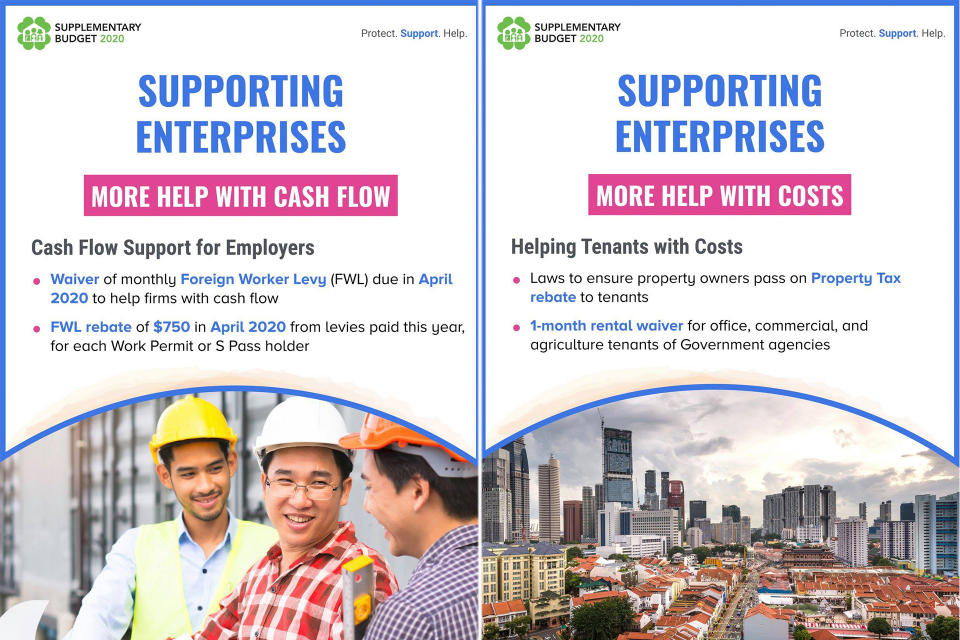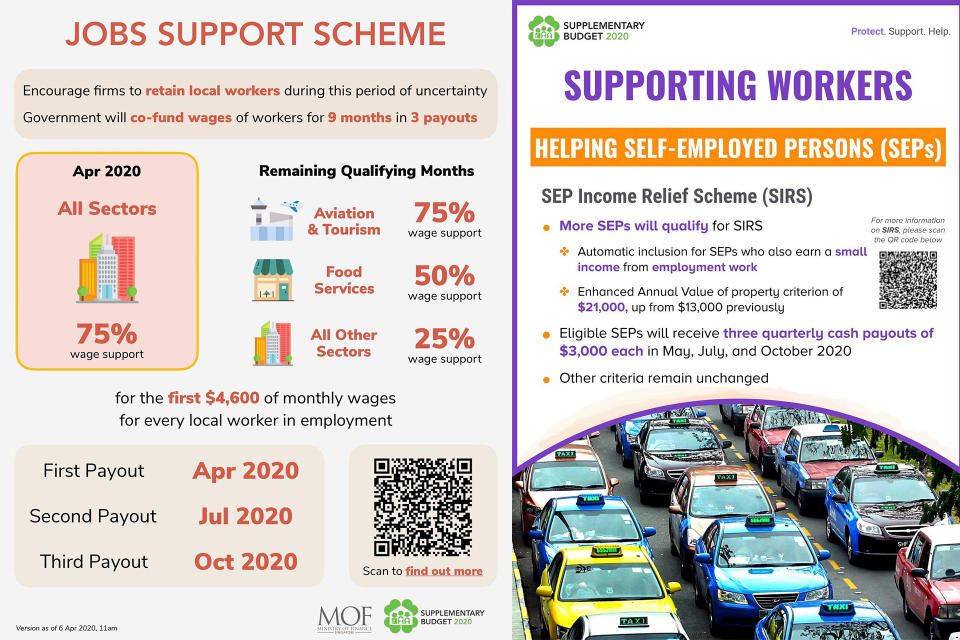COVID-19: $5.1 billion Solidarity Budget unveiled to help Singapore economy through circuit breaker period

SINGAPORE — Deputy Prime Minister and Finance Minister Heng Swee Keat unveiled a $5.1 billion Solidarity Budget in Parliament on Monday (6 April) to help the Singapore economy tide through its one-month circuit breaker period.
The sum comes on top of $48 billion Resilience Budget that was announced on 26 March and the $6.4 billion Unity Budget that was unveiled on 18 February.
“Taken together, the Government’s response to COVID-19 will total $59.9 billion, or about 12 per cent of gross domestic product,” said Heng. He added that, with the latest monetary injection, Singapore’s overall budget deficit for the 2020 financial year would increase to $44.3 billion, or 8.9 per cent of GDP.
To fund the Solidarity Budget, Heng said he had sought and obtained President Halimah Yacob’s in-principle approval to draw another $4 billion from Singapore’s past reserves. This is in addition to the $17 billion approved to be drawn from past reserves to fund the Resilience Budget.
Heng said the additional $1.1 billion for the Unity Budget would be “funded from the fiscal space of this term of government”.
“The Unity, Resilience and Solidarity Budgets all build upon and reinforce each other. Together, they represent our strong and decisive response to the economic and social consequences of the COVID-19 crisis,” said Heng.
“The primary aim of this Solidarity Budget is to take further steps to save jobs and protect the livelihoods of our people during this temporary period of heightened measures. We will also help businesses preserve their capacity and capabilities, to resume activities when the circuit breaker is lifted,” he added.
On 3 April, Prime Minister Lee Hsien Loong announced that Singapore would be closing most of its workplaces – except those involved in essential services and key economic sectors – from Tuesday till 4 May. Schools and and institutes of higher learning will also switch to full home based learning from Wednesday till 4 May.
These “circuit breaker” measures are meant to curb the spread of COVID-19 amid a rise in locally transmitted cases. As of noon on Sunday, Singapore has seen a total of 1,309 confirmed COVID-19 cases and six deaths from the coronavirus.
Helping workers, lowering labour costs


Among the moves to help employers and workers, the government will raise the wage subsidy for all firms to 75 per cent of gross monthly wages for the first $4,600 of wages paid in April, for each local employee. This comes under the Jobs Support Scheme (JSS), which will now see its first payout made in April instead of May as earlier announced.
Heng noted that the $4,600 wage cap does not mean that workers earning more than that amount do not qualify. “Rather, it means that this wage subsidy applies to every one of our over 1.9 million local employees,” he said.
“The aim of this strong support is to directly reduce firms’ wage costs, to help them retain their workers. I expect firms to make use of this JSS support to continue paying your workers and refrain from putting workers on no-pay leave during this period, or worse, retrenching them,” said Heng.
To help ease labour costs, the government will also waive the monthly foreign worker levy due in April. Employers will also be provided with a foreign worker levy rebate of $750 for each of their work permit or S-pass holders, “based on previous levies paid in 2020”. These rebates should be rolled out as early as 21 April, said Heng.
For those who are self-employed, the Self-Employed Person Income Relief Scheme (SIRS), will be extended to automatically include self-employed persons who also earn a small income from employment work.
Second, the annual value qualifying threshold for SIRS will be raised to $21,000, up from $13,000, to include those who live in some condominiums and other private properties.
“With these enhancements, a total of about 100,000 self-employed persons will automatically be eligible for the scheme, and will receive three payments of $3,000, starting from May 2020,” said Heng.
To help businesses with their rental costs, Heng said that a Bill would be introduced in Parliament on Tuesday to ensure that the 100 per cent Property Tax Rebate that was earlier announced for non-residential properties would be passed down in full to tenants.
Businesses will also get a boost in terms of financing, with the government raising its risk share for loans made under three schemes – the Temporary Bridging Loan Programme; Enterprise Financing Scheme – SME Working Capital Loan; and Enterprise Financing Scheme – Trade Loan – from 80 per cent to 90 per cent. This will apply to loans initiated from 8 April this year to 31 March next year.
Helping households

Heng also announced that all adult Singaporeans – those above the age of 21 – would receive a one-off Solidarity Payment of $600 in cash.
“For the majority of Singaporeans who have provided their bank account details to the Government, the Solidarity Payment will be credited directly into their bank accounts by (14 April). The rest will receive the payment by cheque, to be issued in stages later, starting from (30 April),” he said.
Other cash payouts that were earlier announced will be brought forward to June instead of August, including the $100 PAssion Card top-ups that will be given in cash to Singaporeans aged 50 and above; the additional $300 payout for each parent with at least one child aged 20 and below; as well as the remaining $300 or $600 from the higher tiers of the Care and Support – Cash payout scheme.
“Not everyone will need these cash payouts. I am very encouraged that many have written to me, my Ministerial colleagues and MPs, that they do not need the cash payouts, and suggest that we give these to those who need the cash more,” said Heng.
‘Generational crisis’
Describing the COVID-19 pandemic as a “generational crisis with no precedent”, Heng said Singapore has brought all its resources and administrative capacity to bear to protect lives and livelihoods.
“We have the plans, and the financial resources to carry out these plans without burdening future generations with the bill... The key now is in how we pull together, in solidarity, as a nation to implement these plans, and make adjustments as the situation continues to evolve,” he said
Stay in the know on-the-go: Join Yahoo Singapore's Telegram channel at http://t.me/YahooSingapore
Related stories:
COVID-19 Budget: Singapore allocating additional $48 billion to combat ‘unprecedented crisis’
Budget 2020: $5.6b packages to help alleviate economic slowdown



